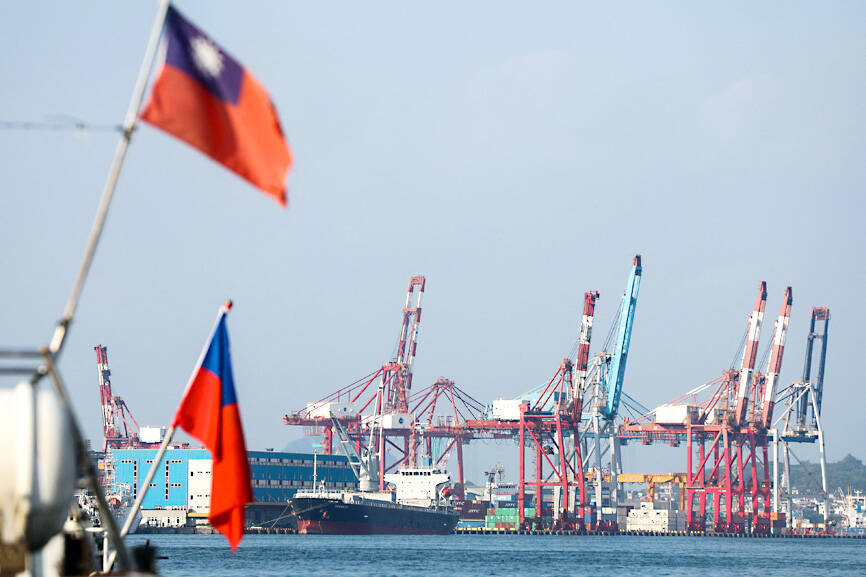Beijing is using trade to manipulate Taiwan’s politics, the Office of Trade Negotiations said yesterday after China announced that a ban on imports of more than 2,455 categories of Chinese goods constituted a “trade barrier.”
The Executive Yuan office said in a statement that a Chinese probe contravened WTO rules and Taiwan did not accept it.
The investigation was politically motivated and China should immediately cease its political manipulation of Taiwan, it said, without elaborating.

Photo: Cheng I-Hwa, AFP
The statement was echoed by the Mainland Affairs Council.
Trade disputes should be handled through the WTO, the council said, adding that China’s decision to bypass the global body to carry out the investigation showed that it was politically motivated.
Earlier yesterday, the Chinese Ministry of Commerce said in a statement that Taiwan’s restrictions on imports of the products from China were a barrier to trade.
The decision was made after a probe into potential trade barriers, which began on April 12, it said.
There was no indication of what China might do in response to its judgement.
The announcement comes less than a month before Taiwan’s presidential and legislative elections on Jan. 13, sparking concerns that China would use the issue to influence voters.
The Ministry of Economic Affairs also called for negotiations to be held under the WTO framework.
Taiwan is willing to discuss trade issues with China based on the rules and mechanisms of the WTO, it said in a statement.
The two sides can resolve issues there because both are WTO members, it said.
China has also banned imports of Taiwanese agricultural, fishery and food products without warning, resulting in Taiwan having to initiate corresponding measures to ensure the rights and interests of operators, it added.
“If China is sincere, Taiwan is ready to talk at any time,” Democratic Progressive Party (DPP) spokesman Chang Chih-hao (張志豪) said, also calling for WTO mechanisms to be used.
The announcement of an investigation so close to Taiwan’s elections clearly shows that China intended to exert its interference and harm cross-strait relations, Chang said.
Separately, Broadcasting Corp of China (中廣) chairman Jaw Shaw-kong (趙少康), the vice presidential candidate of the Chinese Nationalist Party (KMT), said it was appropriate for Taiwan to proportionally protect its agricultural products and goods because of the geographical size difference between Taiwan and China.
China should not only think about mutual interests, but should also take the hard work of Taiwanese farmers into consideration, Jaw said.
“Taiwanese farmers are all small stakeholders who face high operating costs,” he said. “Once the market is opened, it will pose a great blow to Taiwan’s agriculture.”
Separately, Thomas Wu (吳東亮), chairman of the Taipei-based Chinese National Association of Industry and Commerce, urged the two sides to communicate to promote understanding.
The government should take supporting measures to assist vulnerable industries in the agriculture and fisheries sectors due to China’s import bans, Wu said.

PREPAREDNESS: Given the difficulty of importing ammunition during wartime, the Ministry of National Defense said it would prioritize ‘coproduction’ partnerships A newly formed unit of the Marine Corps tasked with land-based security operations has recently replaced its aging, domestically produced rifles with more advanced, US-made M4A1 rifles, a source said yesterday. The unnamed source familiar with the matter said the First Security Battalion of the Marine Corps’ Air Defense and Base Guard Group has replaced its older T65K2 rifles, which have been in service since the late 1980s, with the newly received M4A1s. The source did not say exactly when the upgrade took place or how many M4A1s were issued to the battalion. The confirmation came after Chinese-language media reported

The Taiwanese passport ranked 33rd in a global listing of passports by convenience this month, rising three places from last month’s ranking, but matching its position in January last year. The Henley Passport Index, an international ranking of passports by the number of designations its holder can travel to without a visa, showed that the Taiwan passport enables holders to travel to 139 countries and territories without a visa. Singapore’s passport was ranked the most powerful with visa-free access to 192 destinations out of 227, according to the index published on Tuesday by UK-based migration investment consultancy firm Henley and Partners. Japan’s and

A Ministry of Foreign Affairs official yesterday said that a delegation that visited China for an APEC meeting did not receive any kind of treatment that downgraded Taiwan’s sovereignty. Department of International Organizations Director-General Jonathan Sun (孫儉元) said that he and a group of ministry officials visited Shenzhen, China, to attend the APEC Informal Senior Officials’ Meeting last month. The trip went “smoothly and safely” for all Taiwanese delegates, as the Chinese side arranged the trip in accordance with long-standing practices, Sun said at the ministry’s weekly briefing. The Taiwanese group did not encounter any political suppression, he said. Sun made the remarks when

BROAD AGREEMENT: The two are nearing a trade deal to reduce Taiwan’s tariff to 15% and a commitment for TSMC to build five more fabs, a ‘New York Times’ report said Taiwan and the US have reached a broad consensus on a trade deal, the Executive Yuan’s Office of Trade Negotiations said yesterday, after a report said that Washington is set to reduce Taiwan’s tariff rate to 15 percent. The New York Times on Monday reported that the two nations are nearing a trade deal to reduce Taiwan’s tariff rate to 15 percent and commit Taiwan Semiconductor Manufacturing Co (TSMC, 台積電) to building at least five more facilities in the US. “The agreement, which has been under negotiation for months, is being legally scrubbed and could be announced this month,” the paper said,